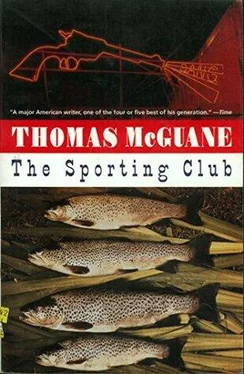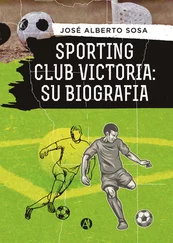There was something not absolutely perpendicular about Olson. He slung himself in his doorway and his lower lip made an ample curve beneath his lengthy lower teeth. “Evening, Jack.”
“What’s … evening about it?”
“Yes, very good,” Quinn said. Olson began patting his pockets in search of something he didn’t find. “Have you and Stanton been talking?”
“Oh, hell, not really I wouldn’t think. He rooted his-self about half through my year’s liquor supply—”
“Jack, you’re stewed, aren’t you?”
Olson danced about, shadow boxing. “Put up your dewks—!”
“Jack—”
“Put them up!”
“Jack—”
“Put them!”
“Have you and Vernor Stanton had a nice talk?”
“Put them up!” He danced a moment more and fell.
“Get up, Jack.”
“I took a spill.”
“I saw you did.”
Olson dragged at Quinn’s clothes getting to his feet. “What are you so interested for?”
“No reason.” Quinn was extremely uncomfortable.
“I know they’re getting rid of me, if that’s what you mean. I know that—” He stopped. “But Stanton wasn’t here about that, was he?”
“Well, yes, indirectly, he was.”
“He was, ay. Sonofabitch. That clears your head. Is that what it was all about. I thought we was just going to tie one on.” Quinn watched him shake off his inebriation. He walked up and down in front of his house with his hands on his head, looking now at Quinn and then into space with an immense question in his movements: he was overwhelmed and offended. “I’ll be a sonofabitch,” was all he could say. He looked over his shoulder at Quinn, amused and offended. “I’ve got to hand it to him. The bastard knows how to go after you. I’ve got to give him credit.” Quinn left him. He would return when Olson’s head had cleared and the information sunk in.
* * *
Look: Janey is packing on the first floor. Quinn stands and doesn’t speak. From above, Stanton, up and shaving, sings “Fa, la, la!” with unique brutality. Quinn thinks, I must talk her out of it, she has nowhere to go, I have to make up for that swine. “Where are you going?”
“God, I don’t know. Away.”
“Where to?”
“Just away.” She stands erect now in a sleeveless blue pullover and her arms are very slightly tanned. Quinn sees that she doesn’t want to go and that now that he has begun to talk her out of it, she won’t go. Still it is lamentable, Stanton rioting in his bed, yet served like a prince; and Janey down here with her bag on the floor and two or three pieces of clothing thrown in.
“Where will you go?”
She sat on the bag. “I don’t know.”
“What about Vernor?”
“I don’t know, I don’t know.”
“Fa, la! Fa, la!” came the brutal voice. Stanton knew they were down here. Quinn wondered how he could let things get to such a sorry state. Worse, he suspected it was intentional. But to what end? To some end, that much was certain. Stanton was a deliberate man and knew how he got his effects. It used to be that behind all of his deliberate acts were abstract principles he could name, like courage, attainment, persistence; or irritation, interference, degradation. Quinn no longer knew how insistent Stanton was about this system; but he had a powerful suspicion that behind certain activities, the dueling or the episode on the bridge or at the Bug House, lingered these abstractions. The most unexpected of Stanton’s deeds had always had such words behind them. Always before, when Quinn had been the victim, he had wondered helplessly what words Stanton linked with his aggressive efforts: antagonism? defeat? menace? And right now, he wondered what word hovered behind himself and behind Janey and what word linked Stanton to them; was it diversion? was it domination? was it revenge? Or none of these?
It was evening again. Quinn walked out onto his porch and sat down. The late sun, summery and vegetable, rotted in the trees before him. He felt that he had found something.
* * *
Janey removed the rubber band from the pack of photographs. She went through three or four and buried them in the deck before handing one to Quinn. It was of a middle-aged man standing as though on a wire between a small, defensive palmetto and an artesian well. “That is Daddy when he was in the mineral springs business. That well looks harmless enough but it smelled to high heaven. The water was used to manufacture a nutritious sodapop that induced vomiting every time. It was also used to make taffy and that wasn’t so bad, although it changed the flavors a little. The cherry taffy tasted like bloodwurst. The lemon taffy tasted like chicken liver. Anyway, the mineral springs business? — it failed. Luckily, Daddy has a pension from the Civil Service and he has built a small house on the property. It is tremendously hot there and the only shade comes from that palmetto you see and there is the smell. There is that. Whenever I visit, the smell gets into my clothes and even my skin. But they use it for everything, cooking and washing included.” She handed him another photo. It was of herself, younger, sitting in a crowd of seated people, young men all around her. The picture showed her the single still spot in a crowd of enthusiasts rising from, or falling back onto, bleachers. She was seated, fingers crisscrossed around the stems of wired carnations, abstracted. “Cotton Bowl, 1960.” The next picture was a single shot of the palmetto followed by one of the artesian well, which had new poignancy for Quinn. Then the mother (Quinn by this time feeling privileged), as faceless as one of the thousands of mid-American roadside picnickers, stout, the backs of her arms full and long as thighs. Mother is standing before the Truman Memorial Library in Independence, Missouri, where she is fresh from failing to run into the former President browsing in the stacks. The next picture, snatched by Quinn, is of Janey sunbathing in a two-piece bathing suit in front of a monster vehicle that turns out to be a dune buggy. She is a goddess. Quinn’s head shudders with recollection of his afternoon of sinistrality. In the background of the picture is the Gulf which, as it is out of focus, is overexposed in discs of whiteness; among them stand men in white crescents of overexposed foam: this is the S.M.U. outing on Padre Island, near Corpus Christi. The photographer is an All-Conference single-wing halfback. He can do poor imitations of Ferlin Husky and Johnny Cash but cannot play a musical instrument. Then Janey hands Quinn a picture probably taken from a rooftop; looking down, it shows the artesian well, center, and the palmetto, lower left; between the two is an indistinct expanse of naked, sandy soil; Quinn believes he sees the shadow of the photographer appended to the long triangle of the roof’s shadow. Is it Janey? He doesn’t ask.
Janey stopped selecting pictures from the pack and Quinn, with plenty to think about, didn’t request another. But he did ask if he could see more later and she answered that she carried a load of stuff with her in these little cases, everything from coral jewelry she bought in Puerto Rico to more pictures to lavaliers to catalogues of the Prado, the Pitti and the Uffizi galleries; and that he was welcome to look through it all; there was nothing she liked better than going through other people’s belongings; nor Quinn, who intended in his gratitude to tell something about Stanton that would be admirable. He had intended so the minute he saw her today, but couldn’t; not that there wasn’t anything to tell, or that it wouldn’t be understood. He didn’t want to.
* * *
He went up to the club to call the office. He had neglected to check in and knew things would have piled up by now. The telephone was in the storage closet. On the shelf beside the phone there was a stack of old Pere Marquette directories which had grown in twenty years since the Second World War from nine to seventeen pages; and from five pages of Olsons to eleven. There was a chest of narrow, sectioned drawers, containing the flies that Jack Olson tied during the winter. The drawers were labeled with tape. Quinn pulled open the drawers and smelled the camphor. Inside each square section the flies were clustered new and perfect and infinitely more consequential-looking than the gross castings and fittings and flanges Quinn’s factory produced. Next to the phone was a pencil sharpener with a rotating ring perforated with various-sized pencil holes, only one of which showed a graphite stain; on the floor below was a cone of fine shavings that Quinn for some reason wanted to put a match to and up would go flies, telephone directories, Centennial Club and Quinn of Quinn Industries. “Mary Beth?”
Читать дальше












